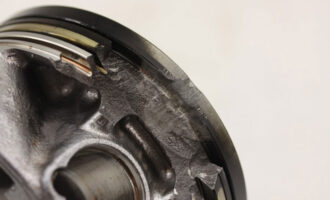Shell Lubricant turns focus to China
By Alfred Wong
Royal Dutch Shell, the number one global supplier of lubricants in terms of volume, is shifting its focus to China. In August, the company sold its 75% stake in Tongyi Lubricants to focus on Shell-branded products.
China, which is now the largest lubricant market in the world, accounts for 44% of the Asian market. U.S.-based consulting firm Kline & Co. predicts a compounded annual growth rate (CAGR) of 1.9% in Chinese lubricant demand in the 2014- 2024 timeframe, which outstrips current global lubricant demand growth of less than 1.0%.
Shell has continued to invest significantly in China because of its unwavering confidence in the Chinese lubricant
market, said James Shen, China/Hong Kong cluster general manager for Shell Lubricants. This, despite the recent slowdown in the Chinese economy, which has impacted lubricant demand as well.

“Shell operates the largest lubricant business in China among international companies, and is also the third largest lubricant supplier in the China market, after Sinopec and PetroChina,” said Shen. “We consider China the most important strategic market in the future and we’ve maintained our investment there in recent years.”
STRATEGIC ALIGNMENT
Shell has increasingly devoted its efforts to the China market as China overtook the United States as the largest car market in the world. A new, state-of-art lubricant blending plant was inaugurated in June at Nangang, in the automotive city of Tianjin in northern China, supplementing seven other lube blending plants in the country. This plant is the largest in Shell’s China system, with a capacity to produce 330 million litres per year and the potential to expand to 500 million litres per year.
Shell also has invested in the China supply chain to achieve consistent delivery of high-quality lubricant products, Shen said. For example, Shell has established a gas-toliquids (GTL) base oil hub in Hong Kong to supply the Chinese market with this high quality base oil used to formulate Shell Helix Ultra with PurePlus Technology, for example.
R&D PROGRAM
Shell has also prioritized its R&D program in China. In Shanghai, it has established a new technology centre, which focuses on lubricant product development and applications for China and the greater Asia region. The centre is one of only three global centres, the other two being in Hamburg, Germany and Houston, Texas, U.S.A. It has become an efficient communication platform for Chinese OEMs, Shen said.
Through technical training and the provision of comprehensive solutions, the benefits to local distributors, customers and OEMs have been significant, he said, citing Jiefang Automobile, Geely and global gear-box supplier Fast as among those that have profited from the new centre.
Innovative marketing activities are central to Shell’s business in China. Shell Helix Ultra was first launched at the Beijing National Aquatics Center in October 2013. The grand and innovative event has put the brand at the forefront of Chinese consumers.
“Chinese customers now know more about lubricant brands, and they want more choices than they would get by relying simply on 4S shops,” Shen said. “That’s why we introduced a new branding strategy for Helix Ultra in China, making Helix the most popular brand among Chinese consumers. According to feedback, Helix is their first choice, regardless of price and other market considerations.
“Shell has been in China for 121 years and our professional sales organisation covers more than 200 cities,” said Shen. “Our outstanding lubricant products include Helix in the automotive industry, Rimula, a heavyduty engine oil (HDEO) and gear-box lubricants and hydraulic oils in the industrial sectors.”
REACHING OUT TO THE INDUSTRIAL SECTOR
The Shell lubricant portfolio also extends to the industrial sector. Shell Omala is a range of industrial gear oils that provide longer oil life and reduced maintenance costs, he said. This oil helped solve problems for Huaneng Power International Inc., one of China’s five biggest power producers, said Shen. Huaneng Power used to experience frequent shutdowns and poor oil-drain intervals. Omala helped extend oil-drain intervals at the plant from one to three years and saved Huaneng USD 278,860 annually. Another example is Tianjin Haowu Benz, a haulier with a fleet of 100 Mercedes Benz Actros. Shell technical experts helped improve the efficiency of the fleet’s operation and reduce maintenance costs.
“Our driveline products successfully extended the vehicle’s oil-drain interval without compromising engine protection, and led to lower maintenance cost and fuel consumption,” said Shen. “Eventually, Tianjin Haowu Benz has reported total annual savings of USD 40,322, due to Shell products.”
CHALLENGES COME WITH OPPORTUNITIES
Declining crude oil prices have resulted in lower base oil prices, which has resulted in fierce price competition in the low to mid-range products. Nevertheless, the Chinese government’s emphasis on energy conservation and emissions reduction has created a market for premium lubricants. Shell plans to seize the opportunities and rise to the challenges as it strives to further entrench itself in the Chinese lubricant market, especially in the high-end segment.







